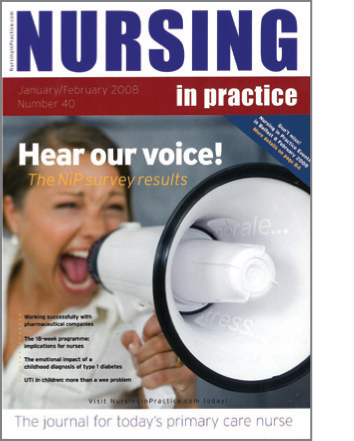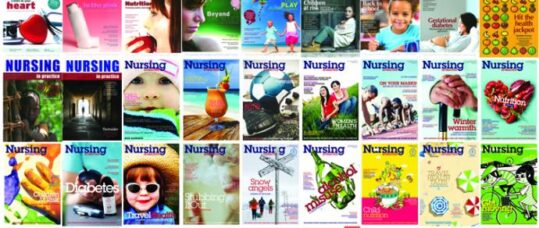Editor David Swan takes a look back through the years with the first 100 editions of Nursing in Practice
June 2001
Nursing in Practice is born. Marilyn Eveleigh, the then editor and now advisory board member, describes it as a magazine for nurses working ‘in and around primary care’, with the intention of ‘actively and vigorously promoting and supporting the profession’.
 April 2002
April 2002
The Nursing and Midwifery Council (NMC) takes over nursing regulation from the United Kingdom Central Council for Nursing. The following month, Lynn Young, the Royal College of Nursing’s community health adviser at the time, encourages practice nurses to discuss their career aspirations.
 April 2004
April 2004
Related Article: Interview: England’s chief midwife on community midwifery and ‘going into other people’s worlds’
The new General Medical Services (GMS) contract is introduced and along with it, the Quality and Outcomes Framework. The latter sees more GP practices hiring professionals other than doctors and nurses – such as healthcare assistants – which allows practice nurses to focus more on patients with chronic conditions.
 December 2004
December 2004
Announced in 2003, Agenda for Change finally comes into force after many delays. Despite giving a clear pay structure, this isn’t mandatory for nurses in GP surgeries, leading to a wide variation in pay for practice nurses.
 February 2008
February 2008
Our survey reveals that 20% of practice nurses describe their morale as ‘slightly worse’ compared with how they felt before the introduction of the GMS contract in 2004. But just shy of 90%
would still recommend primary care nursing as a career option.
 December 2008
December 2008
The NHS Workforce Review Team (WRT) identifies problems with the future of general practice nursing that will hit home years later. WRT claims the practice nurse population is ageing, while the ‘capacity of the system to fast-track newly-qualified nurses into primary care is growing slowly’.
 April 2009
April 2009
The Care Quality Commission is established with the goal of ensuring that services in primary care are safe and regulated through a consistent cycle of inspections.
 September 2013
September 2013
Related Article: Analysis: The vital role of health visitors in empowering homeless families
The Government makes nursing a degree-only profession, meaning other qualifications, such as diplomas, will no longer allow a prospective student to qualify as a registered nurse.
 October 2015
October 2015
Health Education England (HEE) publishes its educational framework for practice nurses. HEE’s aim is to give a clear career progression for general practice nurses, starting at level 5 for a newly-qualified practice nurse, up to level 8 for an advanced nurse practitioner.
 April 2016
April 2016
NMC regulation changes to introduce revalidation for nurses and midwives. They are now required to produce written reflections on their practice and have a reflective discussion with a fellow nurse, in addition to completing their practice and CPD hours.
 December 2016
December 2016
Related Article: Nurse fatigue should be recognised as serious risk to patient safety
Having been announced in November 2015 by HEE, we examine how the new nursing associate role will fit within general practice, and the nursing profession in general. Unison brands the idea as ‘nurses on the cheap’.
 September 2017
September 2017
NHS England’s 10-point action plan for general practice nursing looks to address the recruitment and retention issues for nurses in primary care. We ask whether, almost 10 years after the NHS WRT identified issues with the practice nurse workforce, the plan has come too late.







